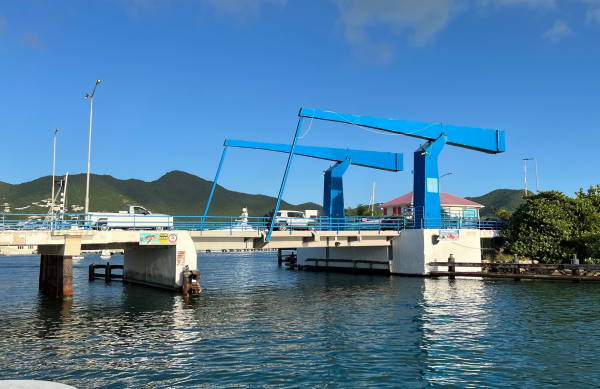 POINTE BLANCHE:--- Port St. Maarten Group (PSG) advise motorists that in connection with the 46th edition of the St. Maarten Heineken Regatta, scheduled for March 5–8, an adjusted Simpson Bay Bridge opening schedule will be in effect in addition to the regular daily openings.
POINTE BLANCHE:--- Port St. Maarten Group (PSG) advise motorists that in connection with the 46th edition of the St. Maarten Heineken Regatta, scheduled for March 5–8, an adjusted Simpson Bay Bridge opening schedule will be in effect in addition to the regular daily openings.
The temporary schedule is intended to facilitate the safe and efficient movement of regatta participants and marine traffic during the event period.
From Thursday, March 5, through Sunday, March 8, the following morning bridge openings will apply: 9:00 AM — Outbound Extra Opening for Regatta participants.
During the afternoon hours, the schedule will be as follows: 15:00 PM — Inbound Extra Opening Regatta Participants.
Motorists are strongly urged to pay close attention to the bridge stop lights and booms and to fully respect all signals once activated, as these indicate that the bridge will be opening.
Compliance is essential in the interest of public safety and the smooth flow of vehicular and marine traffic.
The Simpson Bay Lagoon Authority Corporation (SLAC) further advises tour operators to take the additional bridge openings into account when planning tour routes during the regatta period to avoid unnecessary delays.
The regular scheduled daily Simpson Bay bridge openings remain in effect: 8:30 AM Outbound; 9:30 AM Inbound; 10:30 AM Outbound; 11:30 AM Inbound; 14:00 Inbound; 16:00 Outbound; and 17:00 Inbound.
The Port St. Maarten Group (PSG) family extends best wishes to all participants, residents, and visitors for a safe and serious fun 46th edition of the St. Maarten Heineken Regatta.
Department of Youth Spearheads Youth-Led Research Initiative in Sint Maarten.
 PHILIPSBURG:--- The Department of Youth has spearheaded another youth-led research initiative aimed at strengthening youth participation and advancing Sint Maarten’s commitment to becoming a more child-friendly and youth-responsive community.
PHILIPSBURG:--- The Department of Youth has spearheaded another youth-led research initiative aimed at strengthening youth participation and advancing Sint Maarten’s commitment to becoming a more child-friendly and youth-responsive community.
As part of the initiative, ten young people between the ages of 16 and 19 from several secondary schools on the Dutch side of the island were selected and trained in data collection and research methods. The training sessions, facilitated in February, equipped the participants with foundational skills in developing clear research questions, recognizing bias, and collecting representative information in a respectful and responsible manner.
Following the workshop phase, the youth researchers are now actively gathering responses from their peers at elementary and secondary schools across the island. The team is using the Child Friendly City Checklist, a UNICEF-based measurement tool adapted by the young participants to reflect the Sint Maarten context.
The initiative places young people at the center of exploring how youth experience participation within their communities—specifically, whether they feel heard and how they are engaged in decisions that affect their lives. The data collected will support evidence-based discussions and help inform future policies, programs, and actions focused on youth development and participation.
The Department of Youth expresses sincere appreciation to the participating schools, students, and partners for their continued cooperation and support.
Further updates will be shared as the project progresses into the analysis and the reporting phase.
Firearm Surrender Action.
 DUTCH CARIBBEAN:--- The police forces of the Dutch Caribbean, in cooperation with the Council of Chiefs of Police, announce the launch of an inter-island firearm surrender initiative targeting illegal firearms.
DUTCH CARIBBEAN:--- The police forces of the Dutch Caribbean, in cooperation with the Council of Chiefs of Police, announce the launch of an inter-island firearm surrender initiative targeting illegal firearms.
This joint initiative is a collaboration between the police organizations of the Dutch Caribbean, in close coordination with the Public Prosecutor’s Offices of Curaçao, Sint Maarten, Aruba, and the Caribbean Netherlands, including Bonaire, Saba, and Sint Eustatius.
For the first time, all of these islands are working simultaneously on an initiative focused on the surrender of illegal firearms. The primary objective of this coordinated action is to provide individuals who are in possession of an illegal firearm with the opportunity to voluntarily surrender it during a designated period, without facing criminal prosecution for violations of firearm legislation.
Through this collective action, the islands are sending a strong message: illegal firearms and gun violence will not be tolerated in our communities.
The project reflects the shared responsibility of all islands to strengthen public safety. The synchronized implementation of this action demonstrates a regional strategy of unity, aimed at reducing the number of illegal firearms in circulation and, consequently, preventing firearm-related violence.
Based on the results of this initiative, the police forces, together with the Public Prosecutor’s Offices, will intensify their efforts. This will include conducting controls and judicial searches across various locations on the islands, aimed at detecting illegal firearms.
The police forces of all islands call upon every citizen to take responsibility and contribute to safer communities by making use of this opportunity. By surrendering your illegal firearm now, you avoid criminal prosecution and help save lives.
Further details regarding the timeframe, locations, and procedures for surrendering firearms will be communicated individually by each police force in the coming days.
Commitee Parlatino Matters of the Parliament of Sint Maarten to meet regarding Palatino related Matters.
PHILIPSBURG:--- The Permanent Committee of Parlatino Matters (CPM) of Parliament will be meeting on March 3, 2026.
The Committee meeting is scheduled for Tuesday at 10.00 hrs. in the Legislative Hall at Wilhelminastraat #1 in Philipsburg.
The agenda points are:
1. Incoming documents
2. Advice regarding the number of members of Parliament representation in Parlatino committees (IS/394/2025-2026 dated November 28, 2025)
3. Letter from Parlatino regarding First Vice Chairmanship of the Committee on Economic Affairs, Social Debt, and Regional Development Parlatino Committee (IS/393/2025-2026 dated November 26, 2025)
4. Updates and presentations by Members of Parliament who have attended or participated in Parlatino committee meetings and engagements in the second semester of 2025 (IS/699/2025-2026 dated February 13, 2026 and IS/394/2025-2026 dated November 28, 2025)
Members of the public are invited to the House of Parliament to attend parliamentary deliberations. All persons visiting the House of Parliament must adhere to the house rules.
The House of Parliament is located across from the Court House in Philipsburg.
The parliamentary sessions will be carried live on TV 15, Soualiga Headlines, via SXM GOV radio FM 107.9, via Pearl Radio FM 98.1, the audio via the internet www.sxmparliament.org, www.pearlfmradio.sx and www.youtube.com/c/SintMaartenParliament
Committee of Kingdom Affairs and Inter-Parliamentary Relations (CKAIR) to meet regarding debriefing IPKO and Tripartite and discussions on the upcoming SSS Consultation.
PHILIPSBURG:--- The Permanent Committee of Kingdom Affairs and Inter-Parliamentary Relations (CKAIR) of Parliament will meet on March 3, 2026.
The Committee meeting is scheduled for Tuesday at 14.00hrs. in the Legislative Hall at Wilhelminastraat #1 in Philipsburg.
The agenda points are:
1. Debriefing IPKO and Tripartite Consultations held from February 19-23, 2026, in Aruba
2. Discussions regarding the SSS Cooperative meeting to be held in April 2026
Members of the public are invited to the House of Parliament to attend parliamentary deliberations.
All persons visiting the House of Parliament must adhere to the house rules.
The House of Parliament is located across from the Court House in Philipsburg.
The parliamentary sessions will be carried live on TV 15, Soualiga Headlines, via SXM GOV radio FM 107.9, via Pearl Radio FM 98.1, the audio via the internet www.youtube.com/c/SintMaartenParliament and www.pearlfmradio.sx